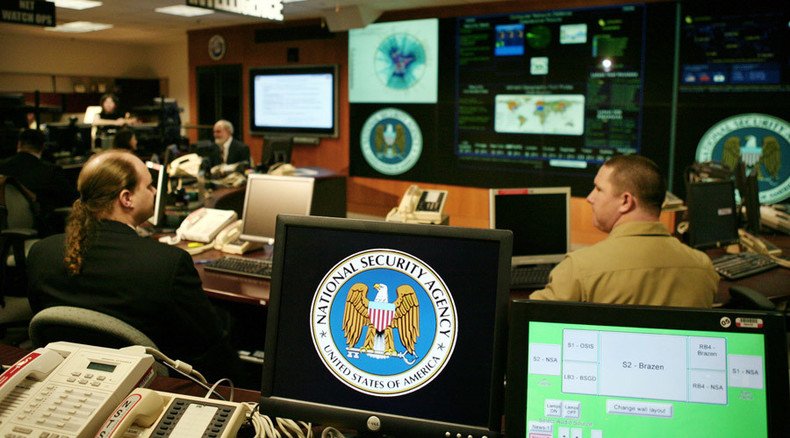Purdue deletes video of author’s academic talk on NSA after federal order

“Universities are not secret agencies,” Barton Gellman bluntly stated in a blog post after a video of his presentation on the National Security Agency at Purdue University was ordered destroyed by US national security authorities.
Gellman was one of three journalists entrusted by whistleblower Edward Snowden with leaked NSA documents in 2014. Since then, NSA slides detailing surveillance programs and methods have been viewed by millions of Americans and are accessible to anyone with an internet connection.
But on September 24, 2015, Gellman’s inclusion of three of those classified slides in an academic speech scared both university and national security officials into what some call an overreaction.
.@LifeAtPurdue destroyed recordings of a lecture by Pulitzer winner @BartonGellman. Sad day for academic freedom. http://t.co/qvOvvrLxV8
— Edward Snowden (@Snowden) October 7, 2015Invited by former Indiana Governor and current Purdue University President Mitch Daniels, Gellman was tasked with keynoting the “Dawn or Doom” colloquium, an event centered on emerging technologies. Gellman’s talk covered Snowden, the NSA, and journalism under the mass surveillance of the national security apparatus. Risky subject matter considering Purdue has a special arrangement with the Pentagon for research purposes.
“The organizers live-streamed my talk and promised to provide me with a permalink to share,” Gellman wrote. However, they never fulfilled that promise after pressure from university lawyers.
During the Q&A portion, Gellman recalls, someone asked if the NSA had declassified the featured slides. Another attendee, described by Gellman as a post-doctoral research engineer, repeated the question to get a clearer answer. “Were the documents you showed tonight unclassified?” he asked. “No. They’re classified still,” Gellman replied.
@BartonGellman no video or audio here but I did snap this pic from #DawnorDoom. Kind of prophetic in retrospect. pic.twitter.com/IJv1UjpiJT
— Jared Wright (@JaredMWr) October 8, 2015Apparently, Purdue’s Research Information Assurance Officer received a breach report, then forwarded it to their Defense Security Service representative. The video that had live-streamed online was completely deleted as a result. Gellman took to Twitter asking if anyone had recorded the talk, but then became fascinated with other stories similar to his.
A 2013 blog post by Johns Hopkins University Professor Matthew D. Green, which was critical of the NSA, was ordered taken down after the university’s Applied Physics Lab warned the professor’s dean of possible “legal consequences” that could result from the post’s content. Johns Hopkins Applied Physics Lab does some work for the NSA and is restricted by that relationship in what it can say. Ultimately the university found the professor wasn’t under the same restrictions and apologized for the near-censorship episode.
Fiorina may have disclosed classified info when revealing she aided NSA as HP head– report
http://t.co/x4IriYRRBOpic.twitter.com/v6VUagmH3W
— RT America (@RT_America) October 8, 2015However, Purdue isn’t apologizing to Gellman. “I am told that Purdue briefly considered, among other things, whether to destroy the projector I borrowed, lest contaminants remain,” Gellman wrote.
“We don’t view this episode as any sort of compromise of Purdue’s commitment to free and open inquiry,” Purdue’s legal counsel stated in an email to Inside Higher Ed. “It was the university’s desire to raise awareness of Mr. Gellman’s area of expertise that brought him to campus in the first place. When the classified nature of some material was confirmed, Purdue’s security officer made a judgment call, based on a reading of regulations, that we shouldn’t disseminate it. Purdue’s DSS industrial security representative confirmed the propriety of this assessment."
“In the course of communicating the decision to the technical team, the entire speech was removed from the website. We have acknowledged that perhaps a better way to comply with the law would have been to block only the classified information in question. But we don’t make the laws; we only do our best to follow them.”
Wiping my talk wasn’t “any sort of compromise of Purdue’s commitment to free and open inquiry,” its lawyer explains. https://t.co/TKjpRazeNw
— Barton Gellman (@bartongellman) October 8, 2015Keeping to the theme of the event at which he spoke, Gellman wondered if this kind of government-university collusion foreboded the dawn of an era of doomed higher education.
“Suppose a professor wants to teach a network security course, or a student wants to write a foreign policy paper, that draws on the rich public record made available by Snowden and Chelsea Manning—those cases will be hard to distinguish from mine.”












